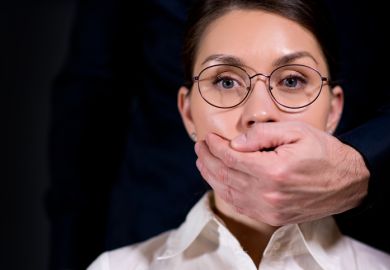Last month, Al Jazeera published an investigation alleging that two professors from the University of Oxford sexually harassed students and fellow staff over a number of years, and were responsible for an abusive, alcohol-laden working environment. It is just the latest in a long line of accusations of harassment and other unprofessional conduct by senior male academics.
Al Jazeera’s report also claimed that Oxford had not adequately protected students. According to the broadcaster, one professor declined to comment and the other disputed its findings, while the university said it takes all allegations of sexual harassment very seriously, along with the well-being of staff and students.
From my undergraduate years at the University of Toronto all the way to my brief tenure on the governing board of what was then the International Society of Anglo-Saxonists (ISAS), I have observed how allegations of such conduct are systematically mishandled. Institutional leaders tend to give several reasons for inaction. Some cite the threat of legal action. Others stress the perpetrator’s scholarly prowess. As Kristen Mills put it in a 2017 article for the journal Medieval Feminist Forum, “it is as though the garden of brilliance may be watered only with the tears of humiliated young women.”
THE Views: Do EDI kitemarks help protect female researchers from online abuse?
In some cases, it is clear that people who should be protecting students and junior colleagues are covering for a friend instead. Presumably, though, some people think they are acting in the best interests of their department, college or field. I want to argue that when an institution enables someone who behaves abusively and unprofessionally, it hurts itself and the wider discipline.
This was not obviously true even a decade ago, when victims could still be bullied into bearing the abuse or leaving quietly. Now, however, the combination of the #MeToo movement and near-constant connectivity means the whisper network is more likely to become a roar.
In 2013, a Yale University Egyptology professor was suspended for sexual misconduct, amid broader complaints of a “hostile work environment” in the department. Yale subsequently halted graduate admissions in Egyptology for three years, a severe blow to a field with only 10 programmes in North America.
In my own discipline, the refusal of ISAS to take a stand on harassment played a central role in several resignations from its board in 2019 (including my own) and the organisation’s subsequent splintering. And, this year, the University of Nevada, Las Vegas announced the closure of its well-known literary magazine, The Believer. The university cited financial and “strategic” considerations, but commenters were quick to point out that the decision followed a Zoom exposure scandal involving the magazine’s editor-in-chief, and that the university had ignored prior staff complaints.
Such visible incidents will multiply in coming years, and they may force institutions to take action, if only for defensive reasons. But a public scandal is not the only form of damage caused by toxic people. Having had a front-row seat to the effects that a powerful abuser can have on a field over decades, I have come to think these even worse than the consequences that come to a department or association.
The major effect is the death of trust. People who experience or even just observe the abuse feel betrayed by the institution that has abnegated its responsibilities – or, rather, by the people with power within it, who may be their mentors or friends.
Abusive academic environments function a lot like dysfunctional families. Without consciously consenting to it, many people around a toxic academic will find themselves trying to minimise the damage. They might take on the “peacekeeping” role, doing extra work and trying desperately to manage the emotions of those who are hurt. Or they may enable destructive behaviour by attempting to please the abuser or denying that anything is wrong. Such people are hard to distinguish from those who are keeping quiet because they, too, are suffering from trauma caused by the abuser.
Once the toxic behaviour becomes public, a circular firing squad of mutual recrimination will sometimes take place, in which even an abuser’s victims can be taken to task for not stopping him.
Some who may not consider themselves “victims” still suffer from a loss of self-confidence, and years later they will feel guilty for their complicity (real or imagined) in the abuser’s actions. And when a professor has a reputation for harassing or sleeping with students, his mentees will worry that any success they enjoy will be attributed by colleagues to an improper relationship. In some cases, they will be right to worry.
So leaders are wrong when they tell themselves they are acting for the good of the many when they crush the few who are brave enough to complain. Regardless, the suffering of individuals ought to be enough reason to take complaints seriously and act upon them when they are substantiated.
Having seen the psychological damage done to the scholars who left Old English studies, as well as to those who stayed, I do not think the good reputation or imagined prestige of any organisation was worth the sacrifice of their mental health.
Irina Dumitrescu is professor of English medieval studies at the University of Bonn.
POSTSCRIPT:
Print headline: Addressing toxic behaviour in academia is in everyone’s interest
Register to continue
Why register?
- Registration is free and only takes a moment
- Once registered, you can read 3 articles a month
- Sign up for our newsletter
Subscribe
Or subscribe for unlimited access to:
- Unlimited access to news, views, insights & reviews
- Digital editions
- Digital access to THE’s university and college rankings analysis
Already registered or a current subscriber?








